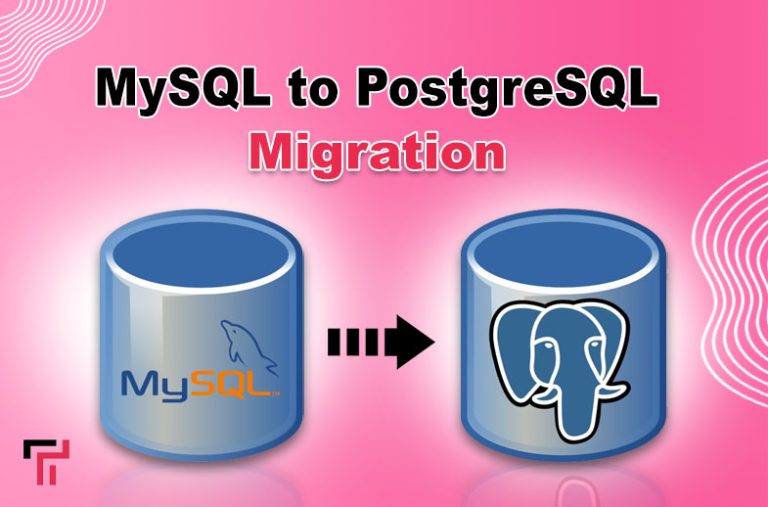In the dynamic world of database management systems, open-source relational database management systems (RDBMS) have become widely popular for their high-quality programs, scalability and administration tools. Two of the most popular open-source databases are MySQL and PostgreSQL; both deliver impressive capabilities in business dealing with complex data needs.
Many organizations want to upgrade their database system in order to boost performance, increase database security, and have more control over the data flow. PostgreSQL is the best option for them to migrate from MySQL, due to its greater functionality, reliability, and extensibility.
In this blog post, I will explore why PostgreSQL is favored over MySQL, the migration process, and automation tools that streamline database transitions.
Let’s start!
Why Businesses Migrate to PostgreSQL?
PostgreSQL offers several key advantages that make it a superior choice for most businesses compared to MySQL:

1. Compliance with ANSI SQL Standards
PostgreSQL adheres strictly to the ANSI SQL standard, ensuring better compatibility with applications requiring advanced SQL functionalities. MySQL, while powerful, does not always fully comply with ANSI SQL, leading to inconsistencies.
2. Advanced Indexing Support
PostgreSQL supports multiple indexing techniques such as B-tree, Hash, GIN, and GiST indexes, optimizing query performance for various use cases. MySQL primarily relies on B-tree indexing, which can be limiting in specific scenarios.
3. Asynchronous Commit Functionality
PostgreSQL allows asynchronous commits, enabling better performance optimization by improving transaction handling. This feature ensures database integrity while reducing the overhead of synchronizing writes.
4. Synchronous and Asynchronous Replication
PostgreSQL provides both synchronous and asynchronous replication methods, allowing databases to maintain consistency across multiple nodes, improving data redundancy, fault tolerance, and scalability.
With these advantages, many businesses and organizations prefer PostgreSQL over MySQL, especially when dealing with large datasets, complex queries, and mission-critical applications.
The Process of Migrating from MySQL to PostgreSQL
Database migration between two advanced RDBMS platforms requires a structured approach to prevent data loss, corruption, and inconsistencies. The common migration process consists of the following key steps:

Step 1: Extracting MySQL Table Definitions
The first step in migrating databases is extracting table definitions from the source MySQL database. This process involves using DDL SQL statements, which define the table structures.
Step 2: Converting SQL Statements to PostgreSQL Format
Since MySQL and PostgreSQL differ in syntax and database structure, the extracted SQL statements must be converted to match PostgreSQL’s format before loading into the destination database.
Step 3: Exporting Data to Intermediate Storage
MySQL data is exported to intermediate storage formats, such as CSV files, to facilitate transformation before moving to PostgreSQL.
Step 4: Transforming Data for PostgreSQL Compatibility
Once exported, the data undergoes transformation to match PostgreSQL’s structure and constraints, ensuring a smooth import process.
Step 5: Extracting Stored Procedures, Triggers, and Views
Stored procedures, triggers, and views from MySQL are extracted in the form of SQL source code and CREATE statements to be converted for PostgreSQL compatibility.
Step 6: Loading Data into PostgreSQL
Once the statements and source code are adjusted, the transformed data is loaded into the PostgreSQL database, ensuring seamless integration.
Step 7: Cross-Checking Database Objects
The final step involves validating the migration process, ensuring all database objects such as tables, indexes, triggers, and relationships are accurately converted.
While manual migration follows a structured approach, it can be time-consuming, error-prone, and complex. Human errors may lead to data corruption or loss, making automation tools highly beneficial.
Automating MySQL to PostgreSQL Migration
Manual MySQL to PostgreSQL database migration is quite a time-consuming and tedious procedure. In fact, data corruption or data loss may be inevitable due to human factors, and it is reasonable to automate the process through dedicated software.
Being founded in 2001, Intelligent Converters has continually strived to introduce high quality database migration and synchronization tools into the market. One of their products is MySQL to PostgreSQL converter which automates the migration of on-premises MySQL, MariaDB or Percona databases to PostgreSQL server or cloud platform such as Azure or Heroku.
This converter is extremely functional and offers high performance, with a migration benchmarked at about twenty thousand rows per second. Compare this to average modern systems due to the lack of need for middleware components to read and write data.
All popular cloud versions of MySQL and PostgreSQL, such as Azure, Amazon RDS, and Google Cloud, are supported. Also, database conversion is automated and scheduled with a customized command line version. In addition, the tool can do non-incremental synchronization of data after initial migration is completed.
Another flexible and powerful capability provided by MySQL to PostgreSQL converter is the filtration of data via SELECT queries. This feature allows selection of columns and records according to the specified filter, with transformation of data before migrating to PostgreSQL.
Some migration projects may also require modifying the data type and other properties of the column in the target PostgreSQL database. For this purpose, the MySQL to PostgreSQL converter provides the feature called ‘custom column mapping’. It allows customization of default value, data type, name, and NULL-attribute for every column as well as excluding some columns from migration.
Final Words
The migration from MySQL to PostgreSQL is a decision made by a business keen on the database performance, scalability and other powerful functionalities. Although manual migration is feasible, it is generally time-consuming, error-prone and inefficient, a situation that makes automated conversion used by intelligent converters’ MySQL to PostgreSQL converter, a very effective alternative.
The excellent use of cloud integration, advanced indexing, replication methods, and improved conformity with SQL forward PostgreSQL as a great database solution for businesses that require reliable and efficient data handling.







